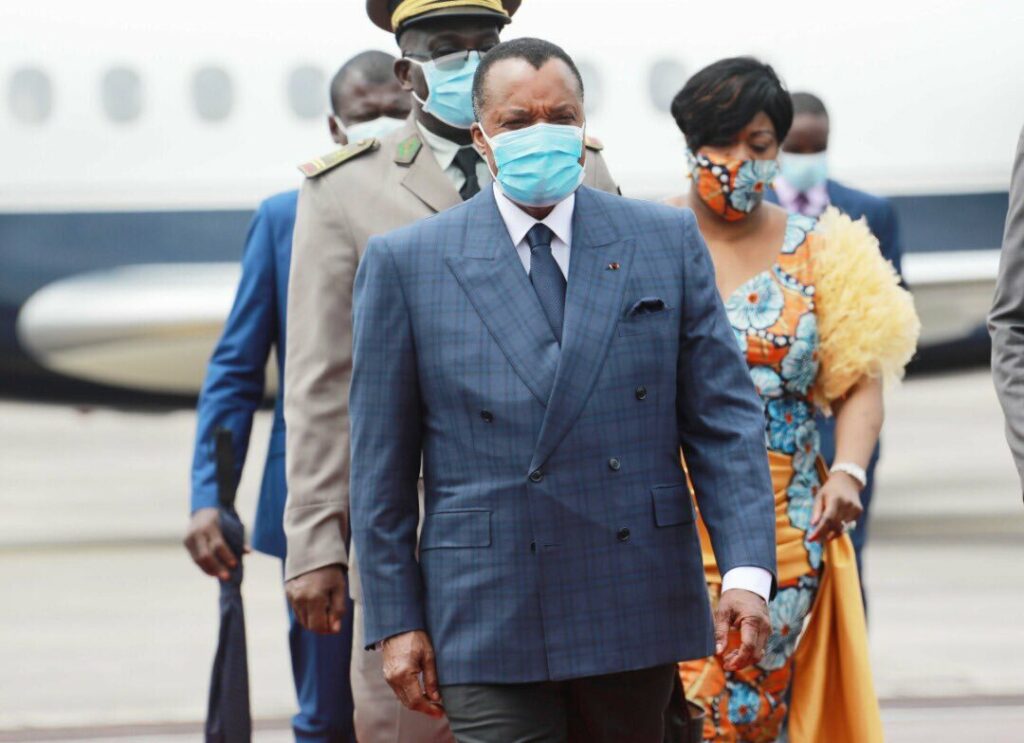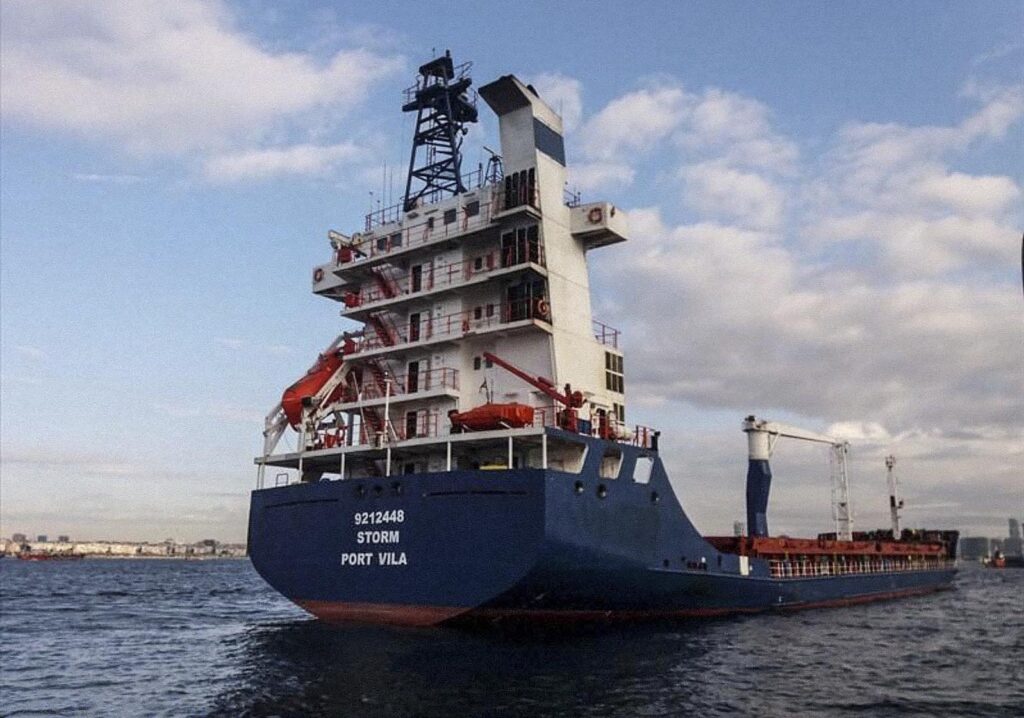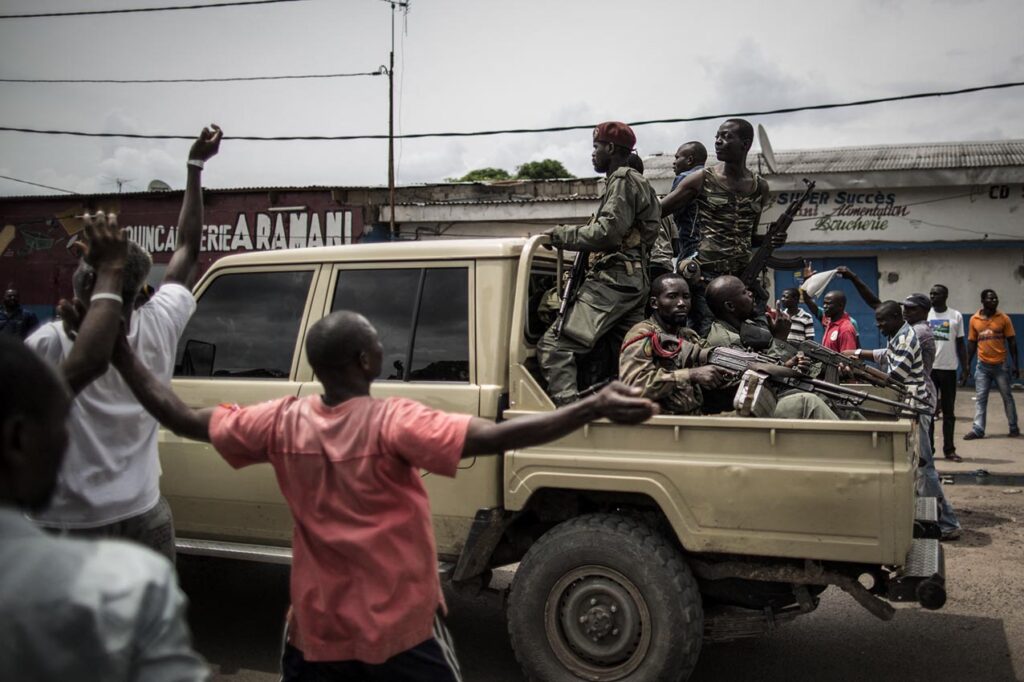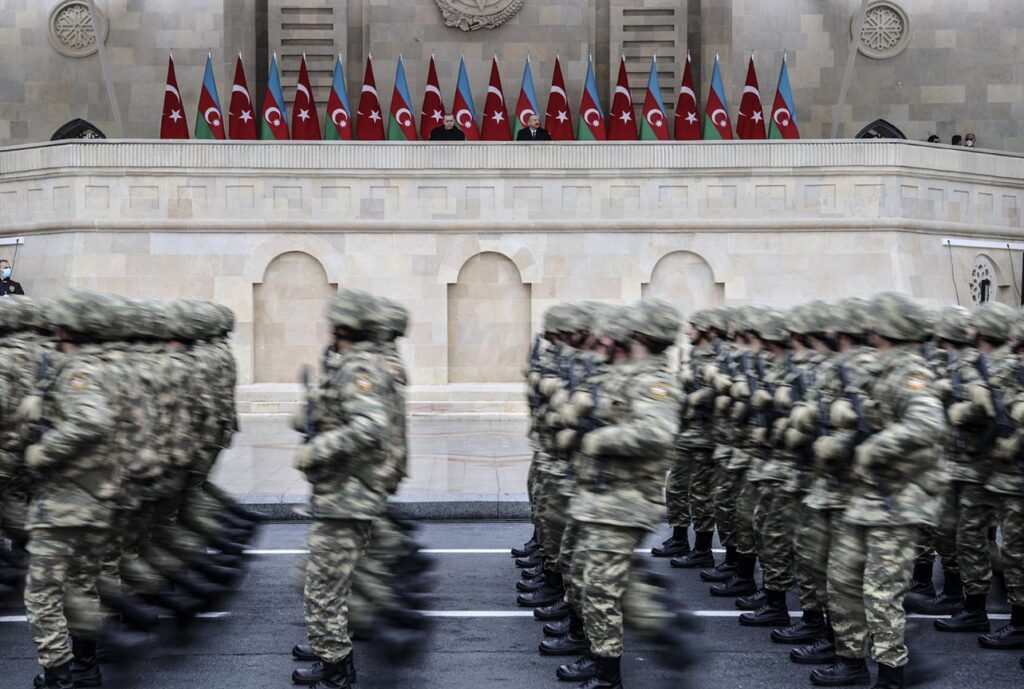Armed and dangerous: Congolese soldiers have been key to maintaining the president’s rule (Marco Longari/AFP)
In January 2020, at the port of Derince on the eastern shores of the Sea of Marmara, a huge cache of weapons was loaded onto the MV Storm. The ship, which is registered in the tax haven of Vanuatu, set sail from Turkey with an arsenal of mortar shells, multiple-launch rockets, and explosives, en route from Azerbaijan to the Republic of the Congo, better known as Congo-Brazzaville.
In total, more than 100 tonnes of weaponry wound its way to a building that appears to be the headquarters of Congo-Brazzaville’s elite Republican Guard, according to a confidential cargo manifest obtained by the Organized Crime and Corruption Reporting Project (OCCRP). The cargo, estimated to be worth tens of millions of dollars, was just the latest in a series of at least 17 arms shipments sent by Azerbaijan’s ministry of defence to the regime of President Denis Sassou-Nguesso since 2015, according to flight plans, cargo manifests, and weapons inventories obtained by OCCRP. Some of these documents were obtained independently by The Continent.
Saudi Arabia was listed as the “sponsoring party” on several of the cargo manifests reviewed by reporters. It’s unclear what that sponsorship entailed, but it could mean that Riyadh paid for the weapons or the cargo deliveries.
 Iron grip: President Denis Sassou Nguesso has been in power for 36 years
Iron grip: President Denis Sassou Nguesso has been in power for 36 years
There are no public records of Azerbaijan exporting these weapons, and no similar records of Congo-Brazzaville importing them. The latest transfer has sparked opposition concerns that Sassou-Nguesso is prepared to use force if necessary to maintain power as the country’s 21 March election approaches.
The president’s well-armed security services are a key reason he has ruled the central African country for 36 years, split between two separate terms, making him one of the world’s longest-serving leaders. His party looms large over parliament, which recently changed the constitution to allow Sassou-Nguesso to run for office again, sparking local and international condemnation. The move means the 77-year-old could, in theory, run in every election for the rest of his life.
OCCRP has obtained confidential documents showing that in the eight months preceding the March 2016 election, and for more than a year after it, Sassou-Nguesso’s security services bought more than 500 tons of arms from Azerbaijan in 16 separate shipments. Just weeks after the vote, the government began a brutal campaign against a militia from an opposition stronghold that lasted for more than a year.
Opposition leaders claim the Republican Guard used the Azerbaijani weapons in that post-election conflict, spurring a humanitarian emergency, which the United Nations said affected about 140 000 people in the region of Pool, in the country’s south. Satellite imagery obtained by international media outlet The New Humanitarian appears to show widespread destruction caused by weapons like rocket launchers and explosives.
There is no way to be certain that these weapons were from that Azerbaijan haul, because Congo-Brazzaville does not declare its arms imports. But exporting countries are strongly encouraged by the United Nations to report shipments, and there are no public records of similar armaments from other countries being sent to Congo-Brazzaville before 2016.
 Weapons were transported on the MV Storm
Weapons were transported on the MV Storm
Buying weapons in a cash crunch
Sassou-Nguesso’s regime is facing one of Africa’s most severe debt crises, raising questions about how these arms shipments have been financed. Documents show that at least two consignments delivered between 2015 and 2018 were sponsored by Saudi Arabia, at a time when Riyadh was vetting Congo-Brazzaville’s application to join the Organisation of the Petroleum Exporting Countries.
Given Congo-Brazzaville’s significant oil reserves, the kingdom had an incentive to have a compliant Sassou-Nguesso government in the Saudi-dominated club, according to leading arms expert Andrew Feinstein, author of The Shadow World: Inside the Global Arms Trade.
Feinstein added that the latest Azerbaijan shipment could have been intended to give Sassou-Nguesso the arms to enforce his political will.
“The timing of this shipment is extremely suspicious, given Sassou-Nguesso’s previous crackdowns around elections,” he said. “The government is likely preparing to quash any dissent around the polls.”
A spokesperson for Congo-Brazzaville’s government did not respond to multiple requests for comment. Azerbaijan’s ministry of defence did not respond to a reporter’s email seeking comment, and neither did a ministry representative listed on multiple documents. Saudi Arabia’s ministry of defence did not respond to questions about the nature of its sponsorship of the arms deals.
Boulevard Denis Sassou-Nguesso
The most recent weapons load, addressed to the Republican Guard at 1 Boulevard
Denis Sassou-Nguesso in Brazzaville in January 2020, included 775 mortar shells and more than 400 cases of rockets designed to be launched from Soviet-era trucks, the confidential cargo manifest shows. The consignment from Azerbaijan was loaded onto the MV Storm at Derince, about 1 000km southeast of Istanbul.
The exact price paid by the Congolese regime for the arms shipment could not be verified, although an expert who examined the cargo manifests said it would be worth tens of millions of dollars. A former senior diplomat with access to information about arms inventories, who asked to remain anonymous for fear of reprisal from authorities, confirmed the authenticity of the cargo manifest and other documents, and noted the sale price for the arms was likely well below market value.
The documents included end-user certificates, which are issued by the country importing the arms to certify the recipient does not plan to sell them onward.
Pieter Wezeman, a senior researcher at the Stockholm International Peace Research Institute, said arms received at a discount are often either surplus weapons or those produced in Bulgaria or Serbia, which are both known for their cheap ordnance.
“It would be less likely that Congo-Brazzaville would be able to buy some of this equipment from … other European countries, which have more restrictive arms-export policies,” he said.
 Crackdown: The conflict in Pool was blamed on the Ninjas, a rebel militia (Marco Longari/AFP)
Crackdown: The conflict in Pool was blamed on the Ninjas, a rebel militia (Marco Longari/AFP)
The Pool offensive
The 100-tonne shipment from Derince was significant, but separate documents reveal another arsenal sent from Azerbaijan between 2015 and 2017 that dwarfed it — and may have had terrifying consequences.
In total, more than 500 tonnes of weapons, including hand grenades, mortar systems and millions of bullets, were sent to Congo-Brazzaville in 16 shipments during those years, according to documents including inventories, end-user certificates, and cargo manifests obtained by reporters. One certificate shows 5 000 grenades imported for the purposes of “training, anti-terrorism, security and stability operations”. It was signed by a special adviser to Sassou-Nguesso on 3 March 2016, just days before the election.
After the vote, the opposition claimed the government had rigged the election in favour of Sassou-Nguesso, and unrest broke out in the capital, Brazzaville. The government blamed the unrest on a militia known as “the Ninjas”, made up of people mainly from the Lari ethnic group and based in the Pool region, which partially surrounds Brazzaville.
The weapons from Azerbaijan were then used, an opposition leader claims, to help to fuel a prolonged armed conflict in Pool targeting the Ninjas.
Amnesty International condemned the offensive as “an unlawful use of lethal force by the country’s security forces”. As the government pursued the Ninjas, witnesses to the carnage told Amnesty that dozens of bombs were dropped from helicopters, hitting a residential area and even a school.
“During the violence in Pool, the regime deployed a scorched earth strategy,” said Andréa Ngombet Malewa, leader of the Incarner l’Espoir political party. “The weapons that they bought from Azerbaijan went straight to that operation.”
Shrouded in secrecy
Azerbaijan has emerged as a key foreign ally of Congo-Brazzaville, providing its regime with discount arms and, perhaps most importantly, secrecy.
By buying from Ilham Aliyev, the strongman president of the notoriously opaque South Caucasus nation, Congo-Brazzaville could stock its arsenal knowing the sales wouldn’t be reported.
Congo-Brazzaville has not reported any arms imports for more than three decades, and because there is no arms embargo in place against the country, it is not required to do so. Nonetheless, a trail exists, with disclosures by other countries showing Sassou-Nguesso has been active in the arms market. In 2017, Serbia and Bulgaria reported exporting 600 assault rifles and 250 grenade launchers, respectively, to Congo-Brazzaville.
In fact, documentation seen by OCCRP shows Azerbaijan has been exporting lethal weapons to Sassou-Nguesso since at least as far back as September 2015. The weapons were initially sourced by Azerbaijan from Transmobile, a Bulgarian company. Other weapons manufacturers have included Yugoimport, a Serbian manufacturer. Neither company responded to requests for comment.
These weapons deals weren’t the only transactions between the two governments that were conducted from the shadows.
Around the same time that it began sending arms to Congo-Brazzaville, Azerbaijan’s air force was also running a passenger route to the country. It stopped in early 2017 and was replaced later that year by Silk Way Airlines, a controversial operator with past ties to the country’s ruling Aliyev family. The airline did not respond to a request for comment.
In addition to previously winning lucrative contracts with the US government to move ammunition and other non-lethal materials, Silk Way was found, in leaked correspondence reported by Bulgarian newspaper Trud, to have used flights with diplomatic clearance to secretly move hundreds of tons of weapons around the world, including to global conflict zones, between 2014 and 2017.
 Secret ally: Azerbaijani armed forces during a military parade in Baku.(Mustafa Kamaci/Anadolu Agency/Getty Images)
Secret ally: Azerbaijani armed forces during a military parade in Baku.(Mustafa Kamaci/Anadolu Agency/Getty Images)
Expected landslide election victory
As his country heads to the polls on 21 March, strongarm tactics mean Sassou-Nguesso is expected to win. He will face Mathias Dzon, his former finance minister from 1997 to 2002, and Guy-Brice Parfait Kolélas, who finished second in the 2016 presidential election.
In 2016 Sassou-Nguesso claimed 60% of the vote, with Kolélas securing just 15%. The United States slammed the government for “widespread irregularities and the arrests of opposition supporters”.
Experts don’t believe the opposition will fare any better this time around. Abdoulaye Diarra, a Central Africa researcher for Amnesty International, said the government is carrying out a pre-election campaign of intimidation, harassment and arbitrary detention against its political opponents.
Fears that press freedom could be under threat ahead of the polls have risen after Raymond Malonga, a cartoonist known for satirical criticism of the authorities, was dragged from his hospital bed by plainclothes police at the beginning of February.
The weapons haul from Azerbaijan has the opposition concerned about the prospect of violence around the polls.
“We are worried that the weapons that Sassou-Nguesso’s regime bought from Azerbaijan could be used to crack down on the opposition during the upcoming election,” said opposition leader Ngombet.
“They don’t want the world to see how much the Congolese people are eager for political change.”
Simon Allison, Sasha Wales-Smith, and Juliet Atellah contributed reporting.